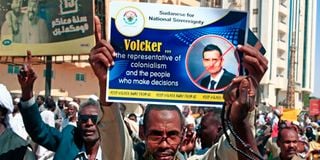Sudan protesters turn against UN envoy, claiming interference

Sudanese pro-military protesters chant slogans as they demonstrate against a UN bid to resolve a political crisis outside the Khartoum office of the UN Transition Assistance Mission Sudan in the Sudanese capital on January 26, 2022.
Protesters in Sudan have turned against a United Nations representative sent there to help with the political transition, rejecting the inclusion of the much maligned military junta in the programme.
Volker Perthes, a German diplomat, found himself in the eye of the storm this week when he launched a transition programme ostensibly meant to help the country move from military to civilian rule.
But the move was controversial because protesters oppose the military coup of October 25 that saw the junta take power and dissolve the government of Prime Minister Abdalla Hamdok.
Perthes heads the United Nations Integrated Transitional Mission in Sudan (Unitams) and part of his job is to support the country’s transition to full democracy.
On Wednesday, Unitams said it had been operating in the country at the request of local authorities and has a full mandate from the UN Security Council.
“A group of demonstrators in front of the Unitams headquarters [have] demanded the expulsion of the mission. We defend freedom of assembly and expression and we offered to receive a delegation at our headquarters, but they refused,” Perthes said in a statement.
Clear mandate
“Unitams is here at the request of Sudan and with a clear mandate from the UN Security Council.”
The statement came after hundreds of protesters took part in vigils in front of foreign embassies and the headquarters of Unitams in Khartoum, rejecting “foreign interference” in the affairs of the country.
On January 8, Perthes announced in a statement the launch of "preliminary" consultations for a comprehensive political process between the Sudanese parties, with the aim of reaching an agreement that would bring the country out of its current crisis.
On December 27, political alliances, parties and civil society organisations launched a group called the National Movement Forces, rejecting foreign interference in Sudan's affairs.
The Sudanese for National Sovereignty, another initiative, was established earlier this month as a coalition of political party actors to demand “the cessation of foreign interference in the Sudanese decision, against the backdrop of international, international and regional initiatives to resolve the crisis”.
It urges the coalition and the initiative to find a national consensus and resolve the political crisis by holding dialogue between all sections of the population.
National sovereignty
The protesters, who came out in response to a call from the Sudanese for National Sovereignty and the National Movement Forces, carried banners with the words "respect for national sovereignty", "national decision or leave'', and "because we are a sovereign state, we reject your interference".
Muhammad al-Bashir al-Kabbashi, one of the coordinators of the protests, strongly criticised some politicians who have “been rushing towards Volker”, and considered it embarrassing that their reference points are “embassies and missions”.
The protesters say they had earlier submitted a memorandum to the UN on what they want to do to run the country without directions from outside. They claim the UN did not act on it.
“Sudan is not for sale and we want to send a message to those who go begging the colonialists,” he said.
“The UN will not help you. It is after dismantling our country by creating new problems.”
The protesters’ rejection of UN plans could twist the plot further in a country that has seen demonstrations against the junta turn violent.
Since October 25, Sudan has witnessed protests in response to exceptional measures, notably the imposition of a state of emergency, the dissolution of the Sovereign Council, the dismissal of PM Hamdok and the arrest of officials and politicians.





